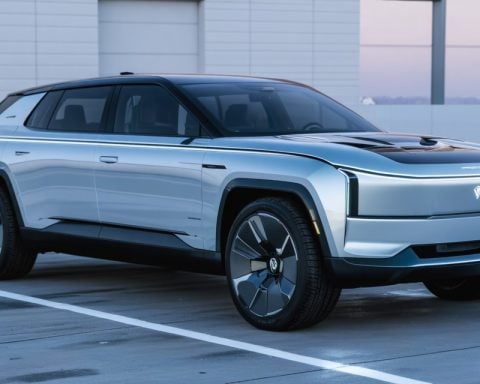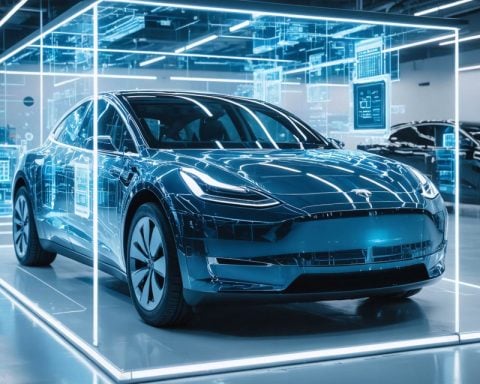The Facts Unraveled
Recent claims from Michigan Democrats suggest that General Motors’ Factory Zero, which specializes in all-electric vehicles, has ceased operations due to Donald Trump’s executive orders. However, an investigation reveals that this assertion holds no weight. Trump’s administration took action primarily to revoke a previous executive order from Joe Biden, with no immediate impact on the automotive sector.
Initially, the Michigan Democrats claimed that Trump’s actions were adversely affecting auto workers—asserting that Factory Zero was already facing idling issues. However, it was later clarified that the plant had only been shut down for holiday breaks and scheduled upgrades.
Factory Zero, located on the Detroit-Hamtramck border, has plans to resume operations after the break. The facility is set to produce models like the GMC Hummer EV and has received significant investment—over $2.5 billion—from General Motors.
The Michigan Democratic Party’s earlier statements were revised after media inquiries, acknowledging a miscommunication. Experts remark on the implications of these political narratives, emphasizing that accuracy should remain a priority.
In the face of fluctuating political dynamics, the automotive industry’s decisions regarding production adjustments typically stem from business needs rather than political influence. This situation highlights the importance of careful communication in challenging political climates.
Understanding the Broader Impact: The Automotive Industry in Flux
The recent discourse surrounding General Motors’ Factory Zero raises critical questions about the intersection of politics and the automotive industry in an era dominated by electric vehicle (EV) production. As manufacturing plants pivot to electrification, their operational narratives sway public perception, blending economic realities with political rhetoric. This phenomenon underscores the industry’s susceptibility to misinformation, particularly during polarization around political figures and policies.
As manufacturers like General Motors invest heavily—over $2.5 billion in Factory Zero—they are not just shifting gears for market share; they are responding to global demand for sustainable vehicles. The transition is imperative, as cities worldwide adopt more stringent emissions regulations aimed at combatting climate change. These developments could significantly enhance urban air quality and reduce fossil fuel dependence, ultimately reshaping transportation infrastructure and energy consumption.
Environmental advocates argue that the push for EVs must be coupled with sustainable battery sourcing practices to avoid ecological harm. A shift towards greener technologies invites scrutiny on mining practices for materials like lithium and cobalt, which can have detrimental environmental consequences if not managed responsibly.
Moving forward, the automotive sector must navigate not only competitive market dynamics but also the societal implications of its innovations. The balance between political discourse and corporate responsibility will be pivotal as the industry not only adapts but also leads in shaping sustainable economic practices. The long-term significance of these developments extends beyond mere vehicle production; they capture the essence of a future economy poised for transformative change.
Demystifying Factory Zero: What Really Happened and What It Means for the Future
Understanding Factory Zero and Its Current Operations
Factory Zero, located on the Detroit-Hamtramck border, stands at the forefront of General Motors’ push into the all-electric vehicle market. While recent political claims suggested that operations at this facility had ceased due to a shift in executive orders under Donald Trump, a thorough investigation has clarified that these allegations stem from miscommunication.
The Reality of Operations
Contrary to the assertions made by Michigan Democrats, Factory Zero was not shut down due to political interference but rather due to routine holiday breaks and scheduled upgrades. In fact, this state-of-the-art facility has undergone significant investments—over $2.5 billion—by General Motors, signifying a robust commitment to electric vehicle production, including models like the GMC Hummer EV.
Industry Insights and Trends
The automotive industry operates under complex business dynamics that often do not align with political narratives. Market experts note the importance of accurate communication, especially during times of political flux. With the rise of electric vehicles globally, companies like GM are making strategic decisions based on market demand and technological advancements rather than shifting political landscapes.
Pros and Cons of Factory Zero’s Operations
Pros:
– Significant Investment: Over $2.5 billion investment signifies strong corporate commitment.
– Cutting-Edge Technology: Focus on electric vehicle production boosts innovation.
– Job Creation: Continued operations contribute to local employment opportunities.
Cons:
– Political Miscommunication: Inaccurate narratives can create misunderstanding.
– Market Volatility: Changes in political leadership can impact production strategies.
Future Predictions for Electric Vehicles
The trend toward electric vehicles is only expected to grow. With various states and countries implementing stricter emissions laws, factories like Factory Zero will play a crucial role in the transition to sustainable transportation. GM’s focus on electric models prepares it for an evolving market where consumer demand increasingly favors environmental responsibility.
Key Takeaways
– Miscommunication can lead to misinformation, especially in politically charged situations.
– Factory Zero remains operational and is set to resume full production after upgrades, contributing significantly to the electric vehicle market.
– Continuous investment and innovation in electric vehicle technology are pivotal for the future of the automotive industry.
For more insights on electric vehicle trends and industry innovations, visit General Motors for the latest updates.


















